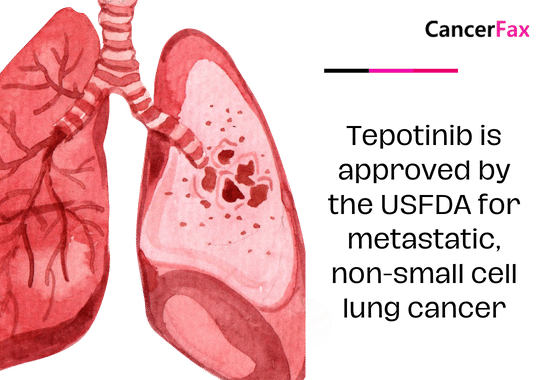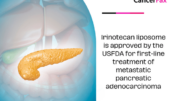Tepotinib is approved by the USFDA for metastatic non-small cell lung cancer
The Food and Drug Administration officially approved tepotinib (Tepmetko, EMD Serono, Inc.) on February 15, 2024, for adult patients with metastatic non-small cell lung cancer (NSCLC) that had mesenchymal-epithelial transition (MET) exon 14 skipping mutations.
Tepotinib received accelerated clearance for this use on February 3, 2021, after showing positive results in the VISION trial (NCT02864992), which was a multicenter, non-randomized, open-label, multicohort research. The transition to conventional approval was made after including 161 more patients and extending the follow-up period by 28 months to evaluate the duration of response.
Effectiveness was proven in 313 individuals with metastatic non-small cell lung cancer (NSCLC) carrying MET exon skipping mutations. Patients were administered a daily dose of 450 mg of tepotinib until disease progression or unacceptable toxicity occurred.
The main effectiveness criteria were Objective Response Rate (ORR) and Duration of Response (DOR), assessed by a Blinded Independent Review Committee. Out of 164 patients who had not had treatment before, the Objective Response Rate (ORR) was 57% with a 95% Confidence Interval (CI) of 49 to 65. Among the responders, 40% had a Duration of Response (DOR) of 12 months or more. Out of 149 patients who had received treatment before, the Objective Response Rate (ORR) was 45% with a 95% Confidence Interval (CI) of 37 to 53. Additionally, 36% of the responders had a Duration of Response (DOR) of 12 months or more.
The predominant adverse effects (≥20%) included edema, nausea, exhaustion, musculoskeletal pain, diarrhea, dyspnea, decreased appetite, and rash.
The suggested dose of tepotinib is 450 mg taken orally once a day with meals.
View full prescribing information for Tepmetko.
Susan Hau is a distinguished researcher in the field of cancer cell therapy, with a particular focus on T cell-based approaches and cancer vaccines. Her work spans several innovative treatment modalities, including CAR T-cell therapy, TIL (Tumor-Infiltrating Lymphocyte) therapy, and NK (Natural Killer) cell therapy.
Hau's expertise lies in cancer cell biology, where she has made significant contributions to understanding the complex interactions between immune cells and tumors.
Her research aims to enhance the efficacy of immunotherapies by manipulating the tumor microenvironment and exploring novel ways to activate and direct immune responses against cancer cells.
Throughout her career, Hau has collaborated with leading professors and researchers in the field of cancer treatment, both in the United States and China.
These international experiences have broadened her perspective and contributed to her innovative approach to cancer therapy development.
Hau's work is particularly focused on addressing the challenges of treating advanced and metastatic cancers. She has been involved in clinical trials evaluating the safety and efficacy of various immunotherapy approaches, including the promising Gamma Delta T cell therapy.
- Comments Closed
- March 5th, 2024






FDA-approved NSCLC drugs 2024, MET exon 14 skipping mutation, MET inhibitor treatment, Precision oncology advances, Rare lung cancer mutations, Targeted lung cancer therapy, Tepmetko for NSCLC, Tepotinib approval
CancerFax is the most trusted online platform dedicated to connecting individuals facing advanced-stage cancer with groundbreaking cell therapies.
Send your medical reports and get a free analysis.
🌟 Join us in the fight against cancer! 🌟
Привет,
CancerFax — это самая надежная онлайн-платформа, призванная предоставить людям, столкнувшимся с раком на поздних стадиях, доступ к революционным клеточным методам лечения.
Отправьте свои медицинские заключения и получите бесплатный анализ.
🌟 Присоединяйтесь к нам в борьбе с раком! 🌟